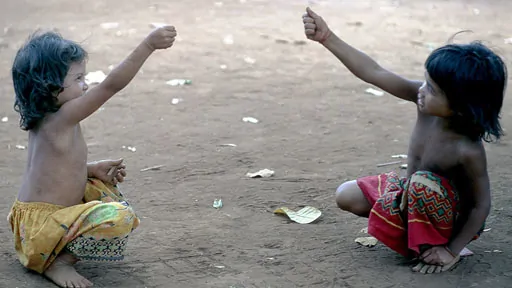Indigenous Calendar October, 2010: Tampuan Children Demonstrate the Evolution of Language

The term 'illiterate' is used commonly; it is also misused frequently. I came to know the difference between this term and the term 'pre-literate' during my college years as a psychology major. I thought at my graduation that I understood 'illiterate,' 'pre-literate' and the difference between them. What was there not to understand or to think about any further? A language has no alphabet so it can't be written — pre-literate; despite having an alphabet available a person has not been schooled in reading and writing — illiterate.
While my understanding was academically correct, it was superficial and had nothing to do with any real understanding of the difference between these terms or what they mean in the non-academic world. It was many years later that I arrived at any real understanding.
It came about during my first visit to Cambodia when I visited the northeastern province, Mondolkiri. Among the indigenous groups who live in that part of the country are the Mnong. I first visited Mnong villages with the assumption that theirs was a pre-literate language — my prior research having uncovered nothing to suggest that it wasn't. In one Mnong village, though, I met a husband and wife whose story is remarkable. They had fled Cambodia in 1970 for Vietnam during the formative years of what would later become the Khmer Rouge. During eighteen years exiled in Vietnam, Mali, Troop's husband, learned literacy in his own language. When it was finally safe for Mali and Troop to return to Cambodia they brought literacy back with them and brought it to the Cambodian Mnong for the first time ever. My prior research about the Mnong language was incorrect and I found myself wondering what other aspects of my prior research about Cambodia's indigenous peoples might also be incorrect.
After leaving Mondolkiri Province I journeyed north to Ratanakiri Province. There I visited Tampuan villages entertaining the possibility that my prior research about the pre-literacy of their language might also be incorrect. It was.
Work had been progressing to develop an alphabet for the Tampuan language before my visit. This alphabet is based on the Khmer script (a rich and ancient writing system), with modifications to allow the written form of sounds unique to the Tampuan language. I was fortunate enough to witness the very first lessons in Tampuan literacy — an experience which helped me begin to understand the difference between the two terms.
Later I visited a village that this Tampuan literacy program had not yet reached. Many observations had already caught my camera's attention in this village and I had taken many photos by the time I saw these two children. At first I hadn't noticed them because they were simply playing a game just like games that children play in any culture everywhere in the world. They were talking in what I knew were simple terms — not because I understood their language but because of their age. They caught my attention only when they fell silent and their communication turned to the non-verbal form. It was then that I realized what this photo would capture — two Tampuan people who will be among the first ever to undergo, in one lifetime, a linguistic progression that was millions of years in the making.
The Tampuan are featured in our documentary, Indigenous Peoples of Southeast Asia.
If you enjoyed reading this article, please consider supporting independent, advertising-free journalism by buying us a coffee to help us cover the cost of hosting our web site. Please click on the link or scan the QR code. Thanks!


